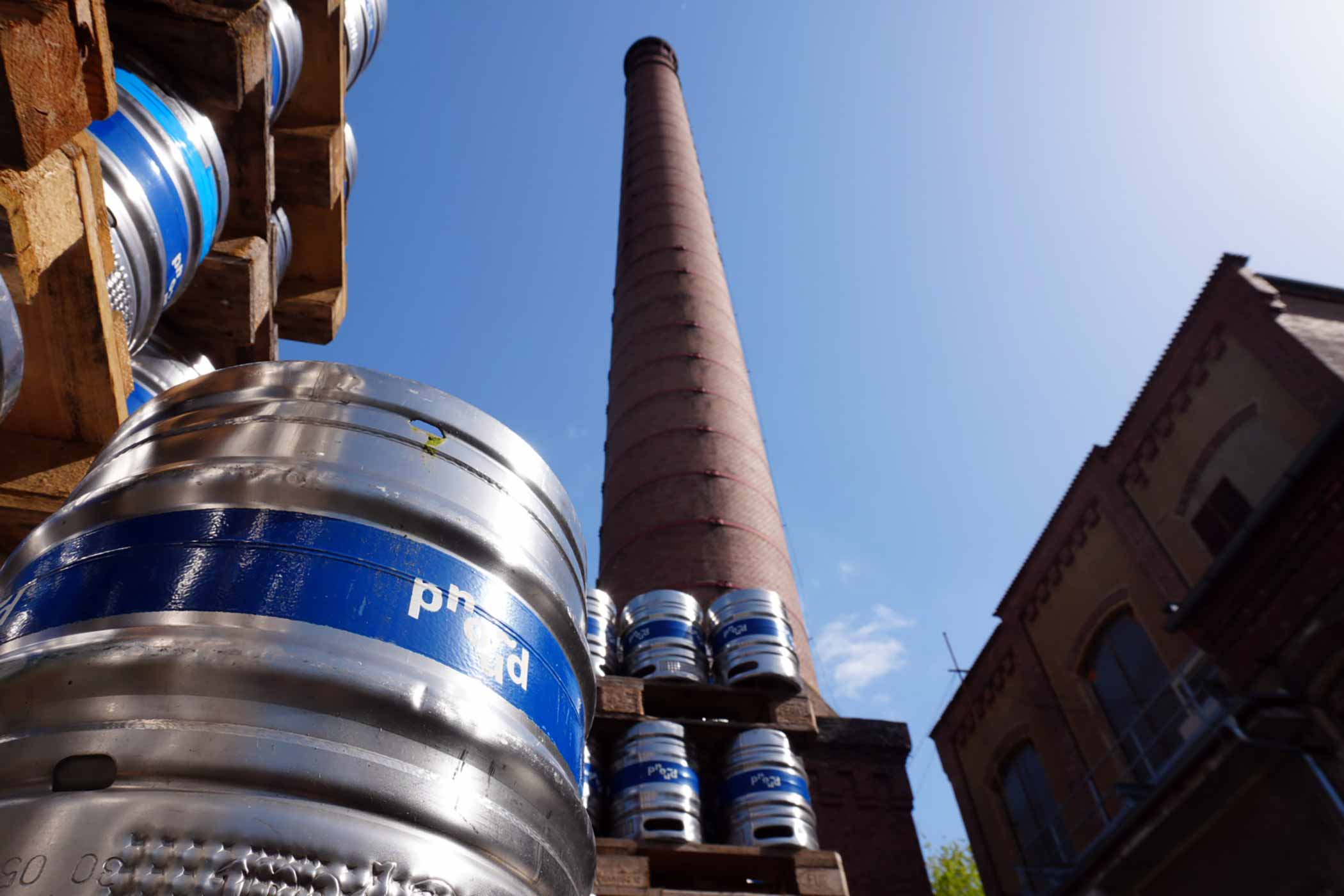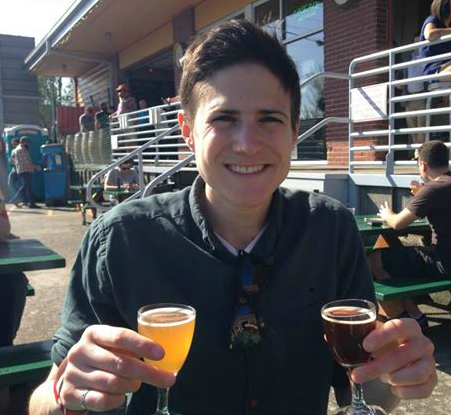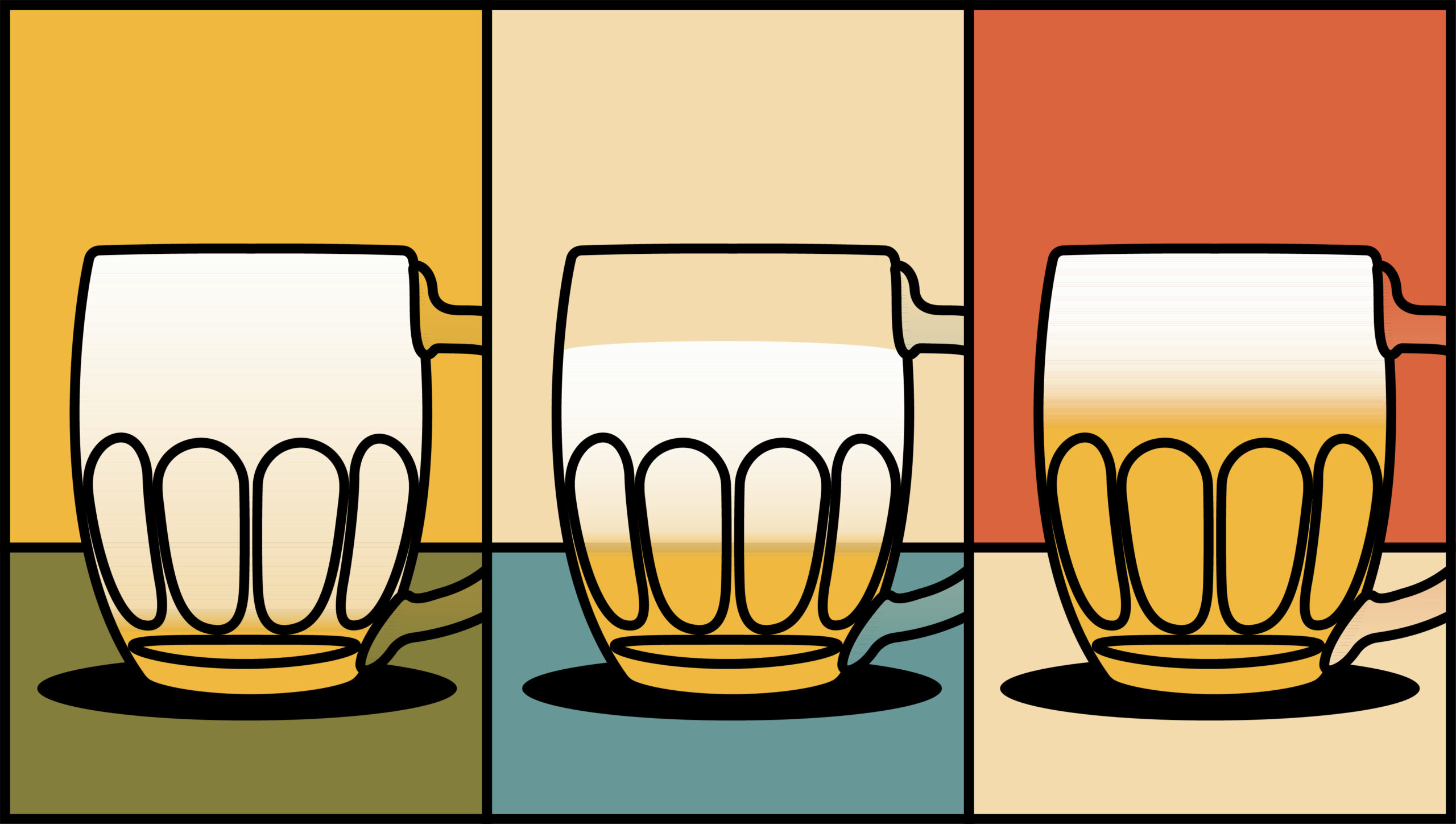Shop
Pivovar Proud: The Electrifying, Experimental Brewery at Pilsner Urquell
Light-bulb moment.
Czech Out More!
This is the first in a series of articles created in collaboration with the Czech Ministry of Agriculture that invited Hop Culture to join a group of American and Canadian brewers on a trade mission trip to the country to learn more about Czech brewing and ingredients.
The Proper Czech Pours: The Best Foam You’ll Ever Drink
A white-haired man with a cherubic face and black thin-rimmed glasses greets us. Over his navy long-sleeve waffle knit, a light black vest stamped over his heart with the words “Pilsner Urquell Brewmaster.” Václav Berka, the thirteenth brewmaster at Plzeňský Prazdroj, aka Pilsner Urquell, joined a lineage stretching all the way back to Josef Groll, the man who literally invented the pilsner.
The now-retired Berka shepherds our group of twenty brewers from across the U.S. and Canada onto a bus. We hang on as we bump down a cobblestone road, past the yellow building stamped with Pilsner Urquell, past the pub crowded with drinkers sporting mugs of pale gold liquid, past the courtyard that Berka assures us is filled in the summer with those dancing and drinking.
The bus keeps going. And we don’t know where.
We aren’t going yet to the brewhouse and caves of Pilsner Urquell, one of the world’s most well-known breweries, which produces a beer drank more than any other in Czechia.
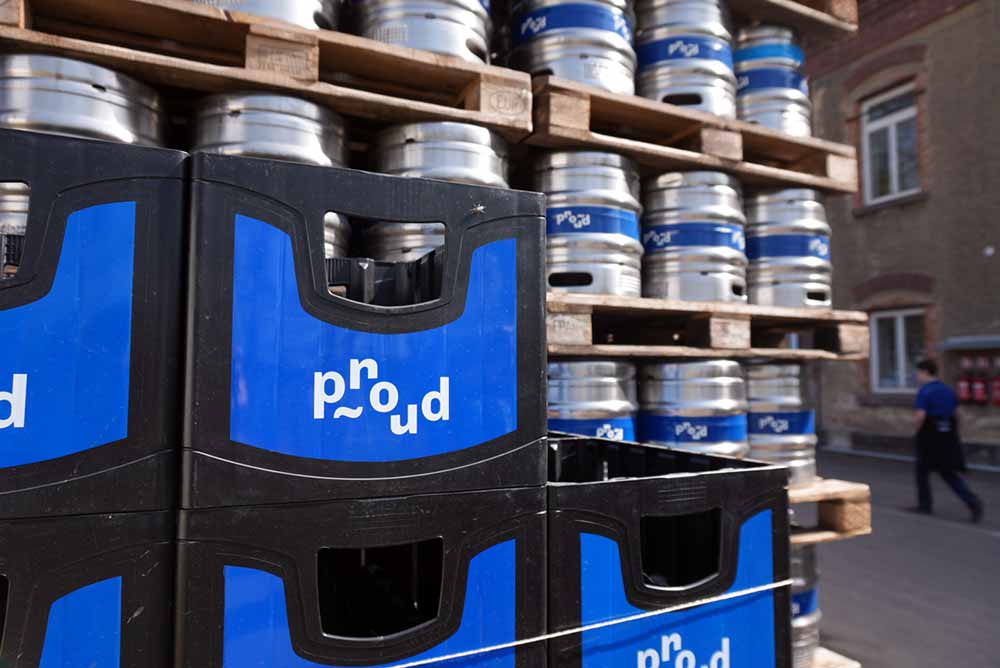
Photography courtesy of Grace Lee-Weitz | Hop Culture
Eventually, we turn down a small driveway, pulling in front of an unassuming building. Stepping outside, we crane our necks up, following a towering brick smokestack high into the sky. In front, polished gleaming steel kegs with a blue band and the letters pulsing like an electric current: Proud.
The word greets us everywhere as we walk inside the three-year-old experimental brewery on Pilsner Urquell’s campus. A row of five gleaming tanks sports Proud in that same royal blue lettering. Milk crates functioning as seats have blue stickers with Proud, chalkboards posted on shiny steel pipes have tiny Proud monikers in the bottom left corner, and white Proud stickers are plastered everywhere.
As we crowd around beside Berka, a petite woman with curly black hair appears at his side. She ties a jacket around her waist over a blue Proud polo.
Lenka Straková has been the brewmaster at Pivovar Proud (recently rebranded as Elektrárna)* for the last three years. Here on the Pilsner Urquell grounds, she and her team make new, experimental beers meant to test the market, electrify the palates of Czech beer drinkers, and push their beer boundaries to new heights.
Straková isn’t pursuing Pilsner Urquell’s past; she’s captaining their future.
*Editor’s Note: Some time after our visit, Pivovar Proud rebranded as Elektrárna. For our experience, while we were there all of the equipment was branded with the Proud name and everyone we talked to at Pilsner Urquell referred to the brewery as Pivovar Proud, so we will continue to use that name in this piece
Captaining a Shocking New Current
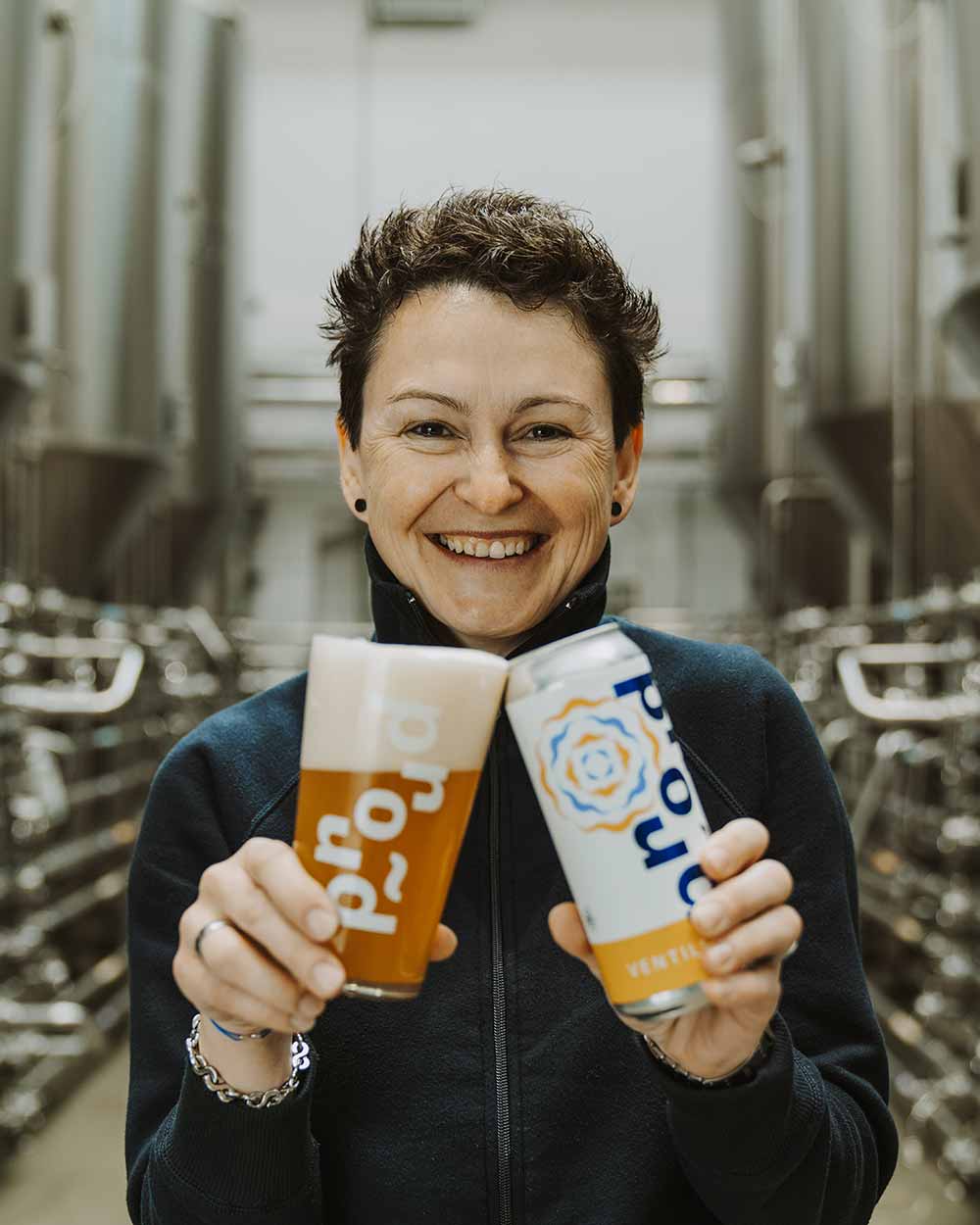
Photography courtesy of Pivovar Proud
Straková calls finding fermentation a “big accident.” Born in Plzeň, Straková says no one in her family actually worked in the brewing industry. Somewhat a rarity in a town known as pilsner’s birthplace and home to Pilsner Urquell’s headquarters, Czechia’s most prominent pilsner-producing brewery.
Straková studied fermentation at university, eventually narrowing her focus to beer, brewing, and malting.
As Straková lets us wander around and examine the gleaming thirty-hectare kit, she shares more about how she ended up amongst these shiny new tanks.
She also called her very first job a bit of an “accident.” Snagging a seasonal gig at Pilsner Urquell after someone called in sick, Straková started in the laboratory, working up to the head there and then in the technology department.
After taking maternity leave, she returned to what she called her “first brewmaster position,” where she helmed new product development across all brands.
“And then the project for [Pivovar] Proud started,” she says.
For five years, Pilsner Urquell wanted to construct an experimental brewery where they could pursue and test new products in the market.
But at the time, the SABMiller group of companies still owned Pilsner Urquell and refused to invest. In 2017, the Japanese-based Asahi Breweries acquired Pilsner Urquell.
Perhaps another “happy accident.”
“After about one or one and a half years under Asahi, they realized there is a small part of the market called ‘craft,’” Straková says with a little smile, “and they were not a part of it.”
Instead of buying a current craft brewery, Asahi decided to build its own on the Pilsner Urquell campus. “They wanted something or someone who could touch the craft and be more present,” says Straková.
Berka joked with us that we were actually responsible. “Because of the pressure from you, craft brewers from the U.S. and Canada, we thought we should make a copy,” he explains, pointing around the group. “We thought, why not use this old electric power station building, so we built a craft brewery there.”
A Nearly Century-Old Power Plant
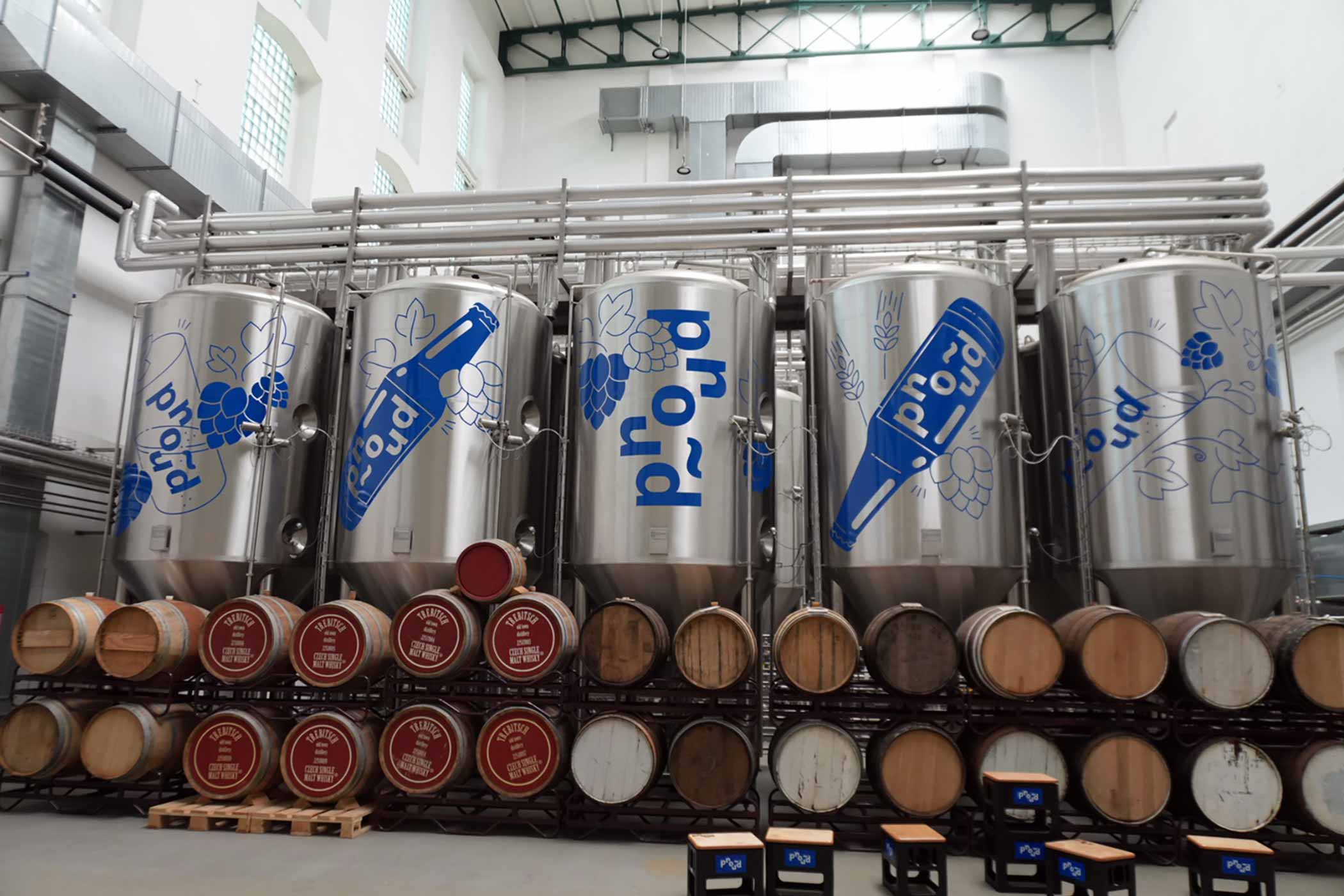
Photography courtesy of Grace Lee-Weitz | Hop Culture
Housed in an almost one-hundred-year-old former power generation plant, proud actually means flow or current in Czech. “It connects us to the powerhouse and all the other streams like electricity and water,” says Straková.
Once a focal point of power at Pilsner Urquell, the current Pivovar Proud building sat vacant for some time.
“This was originally an electricity power station heated by coal that produced steam for the brewery and partly the city, but [eventually] we started to buy steam from a citizen power station, so we closed the building, and it was just empty,” Berka explains. “How better to utilize an empty building than to build a craft brewery!”
Pivovar Proud opened in late 2020 with one goal: to attract a new segment of customers with new flavors.
Everything about this brewery screams new, modern, contemporary…craft.
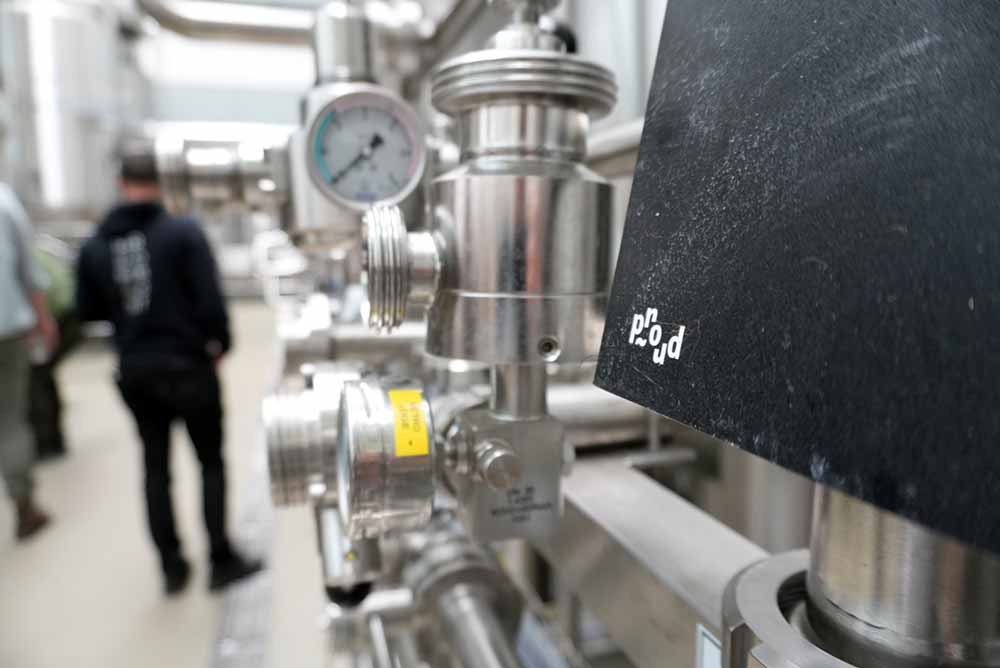
Photography courtesy of Grace Lee-Weitz | Hop Culture
When our group visited in early April, walking into the once-empty warehouse in Plzeň almost felt like back home. We could have been at almost any new-world brewery in North America.
“It’s like a luxury toy!” Straková exclaims. “It’s a three-year-old brewery, and it was built to be one of the newest.”
Whereas at Pilsner Urquell, you’ll find old-school traditional direct flame-powered kettles, at Pivovar Proud, they are all stainless steel, have fixed piping hoses, are steam-run, and have automation.
Here, the aim isn’t to make a beer the same way it has been for years over and over again.
At Pivovar Proud, “We can brew whatever we want,” says Straková with a shrug. “But we always have to sell it.”
If You Brew It, Will They Come?
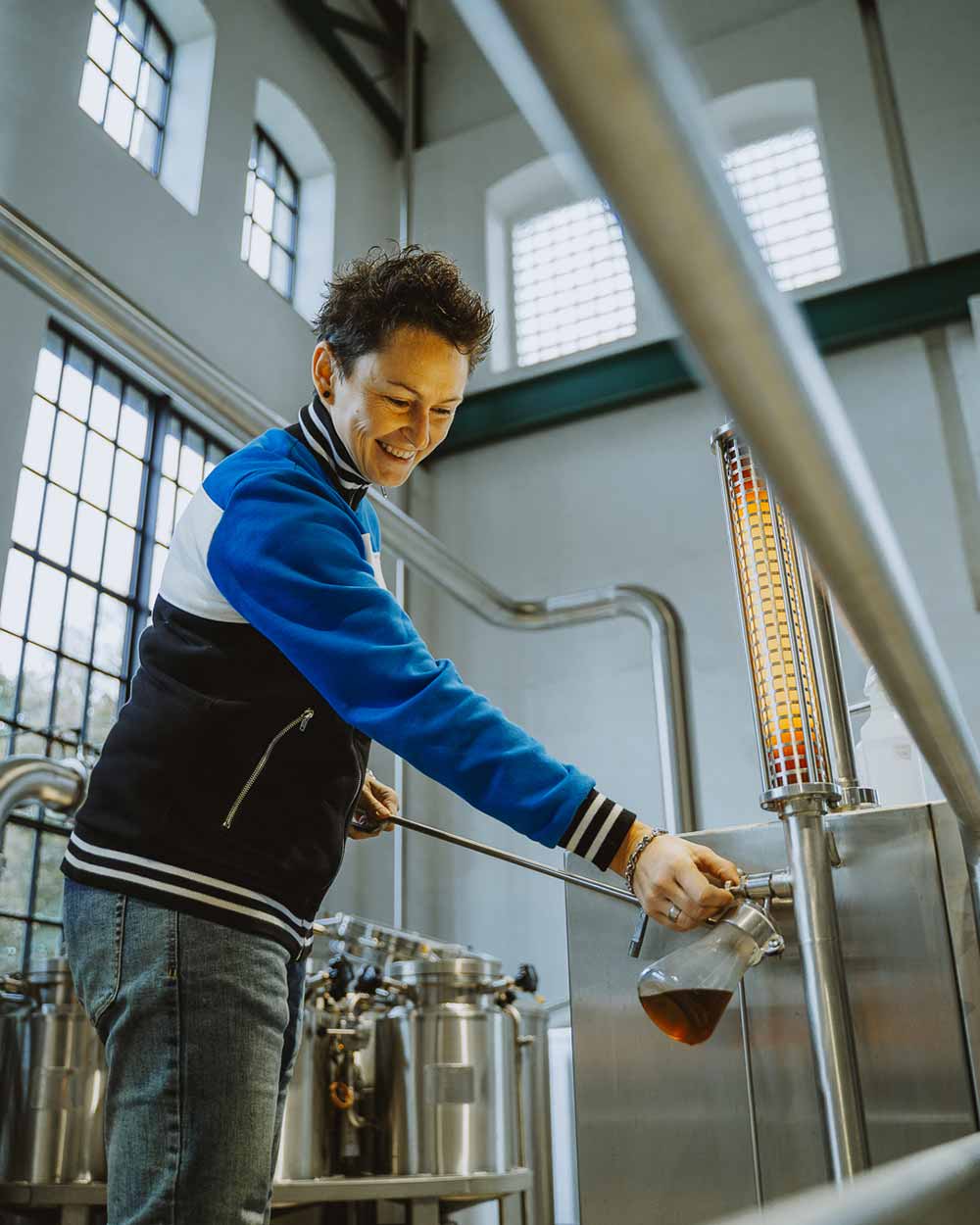
Photography courtesy of Pivovar Proud
If only it were that simple.
In Czechia, one style reigns supreme: Czech pale lager. In the country with the highest per capita beer consumption (184.1 liters annually, about 271 pints of beer per year, according to a study from Kiring Holdings Company), most folks stick to their ways, drinking one brand their entire lives—often either Budějovický Budvar or Pilsner Urquell.
Getting drinkers to break old habits or, at least, try something new can be a challenge. Straková says they watch the market, trying to decipher what consumers want, what’s popular, and where there might be space to make something new.
“Where can we surprise with a complex beer,” she says. “We have to find this balance between drinkable beers and super experimental [ones], which are in the end not drinkable, and no one will buy twice.”
She continues, “We cannot only do crazy things; we have to run the business and, ideally, be self-sufficient.”
So how do you persuade a population that mostly drinks pale lager?
Well, you prove yourself by starting with something familiar.
Ventill – Czech Pale Lager
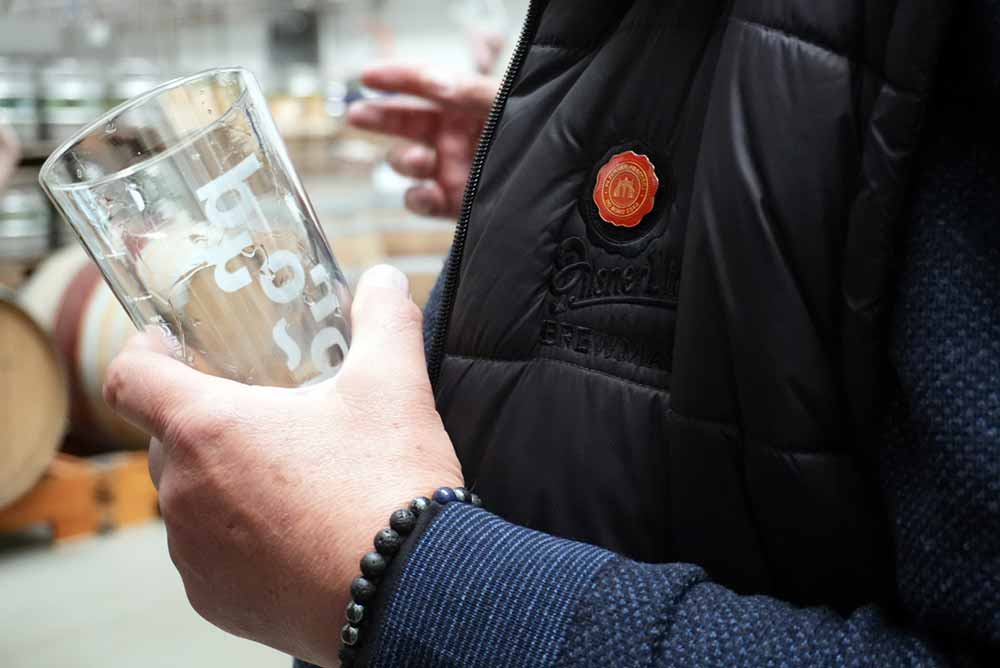
Photography courtesy of Grace Lee-Weitz | Hop Culture
For a minute, Straková disappears, strolling to the fermenters in the back with a large, empty pitcher. When she returns, the pitcher looks invitingly full with a clear, gold liquid. Hands grab tall glasses decorated with Proud as Straková flits from person to person, filling their cup.
“If you want to be a good brewer in Czechia, you have to brew a good pale lager,” Stakova says with a chuckle. “And honestly, as we are a part of Pilsner Urquell, I wanted to have our lager as close to that as possible.”
Of course, Straková quickly emphasizes she cannot copy Pilsner Urquell, nor does she want to, “but we can be very close raw material-wise.”
Both beers start with the same base—only pale malt from the Pilsner Urquell malt house plus a small portion of caramel malt to increase the golden color.
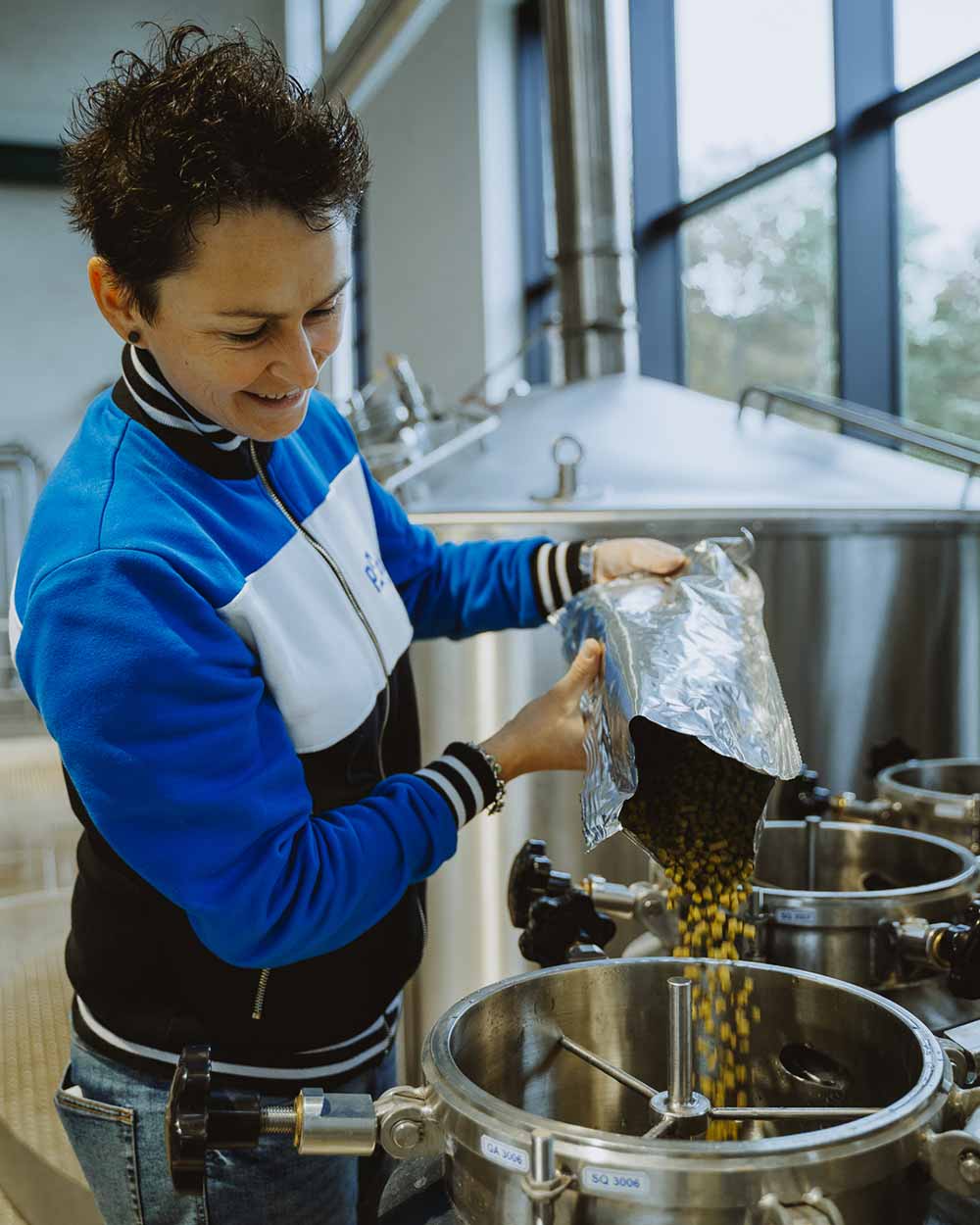
Photography courtesy of Pivovar Proud
The hops remain the same, too—Czech Saaz, because “Saaz hops are just the best,” says Straková, who adds the hops four different times—forty percent at the beginning of the boil for bitterness, twenty percent in the middle, and forty percent at the end for what she calls the “fine aroma.” Lastly, a fifty g/hl dose goes into the whirlpool for aroma and a tiny bit of bittering.
It’s all a balancing act. “Too many hops in the whirlpool can be higher aroma but harsh, while too much addition at the beginning can be astringent with no aroma at the end,” she explains. “It’s all about executing different ratios added during the boil.”
Production-wise, Pilsner Urquell typically goes through a triple decoction, but Ventill only gets double decocted because Proud has a totally different system—steam-powered instead of direct flame.
During fermentation, Straková uses a W-34/70 yeast strain from Weihenstephan in Germany. She feels this strain cleans up the beer and does a great job of preventing the presence of diacetyl, which she doesn’t want here.
Named after the Czech word for the piece in the brewhouse that opens a valve on a steam line to heat something, Ventill is “the heart of our portfolio,” says Straková, noting it’s the top seller. “If we are brewing on steam, this power is the heart of our brewhouse, and the Czech lager is the same in the brewery.”
Straková says they didn’t plan for this beer to sell the most, but she’s not surprised it happened naturally.
If Ventill is the heart of Proud, then the other twenty-three beers they brew in a given year are the nervous system, carrying the electrical current of new experiments to consumers.
The Second Best-Selling Beer at Proud Is…
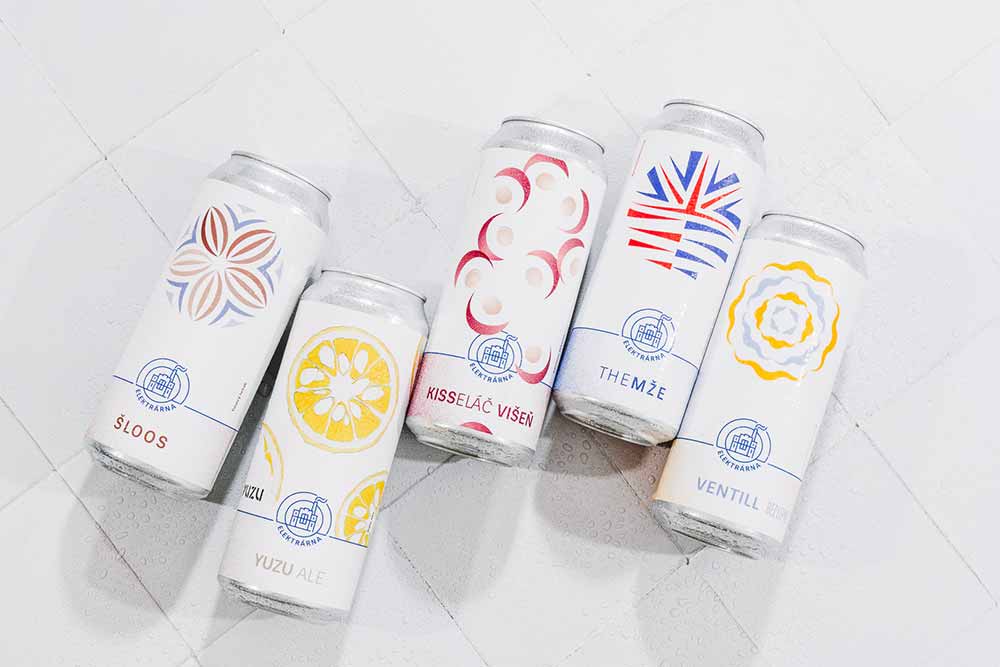
Photography courtesy of Pivovar Proud
As Straková takes us back to check out the tanks, she keeps filling pitchers. Our glasses never empty over the next hour or so, a testament to Proud’s innovation.
According to Straková, perhaps best reflecting Proud’s purpose, the second-best-selling beer at the Pilsner Urquell spinoff changes seasonally, shuffling between a non-alcoholic IPA, a yuzu pale ale, and an English pale ale called TheMže.
As she poured us the latter, Straková tells us she felt an English pale ale could educate Czech consumers.
“With this beer, we’re saying, ‘Hey, in England, they drink [this style] as normally as you drink the Czech draft,’” she explains. “British ale is also very close to the profile of Czech draft beer, but it is still top-fermented … and at the end a drinkable, refreshing light beer.”
A beer bridging cultures, TheMže actually has a double meaning.
The second half of the name refers to the Mže, a nearby river. Straková says they add “The” to the name so that when pronounced fast, it also sounds similar to Thames, the well-known river that winds through London.
Accordingly, Straková adjusts Plzeň’s incredibly soft water for this beer to mimic the not-so-soft water found in London.
Although, Straková says with a laugh, she’s “not that brave to brew with totally hard water.”
She says that for this pale beer, they get halfway to English water.
The malt bill also reflects a mixture of cultures, featuring Czech pale and English pale malt, which Straková explains is slightly higher in proteins, giving the beer a bit more body and maltiness.
Hops include English varieties such as Challenger, Jester, and U.K.-grown Cascade. “They give the beer this lighter, hoppy aroma but are still herbal and floral, quite similar to Czech hops,” says Straková.
An English top-fermenting yeast strain called ESB finished this pale ale, which indeed had the lovely crispness of a Czech pale lager combined with the earthier, herbaceousness of an English pale.
Proud of All Their Beers
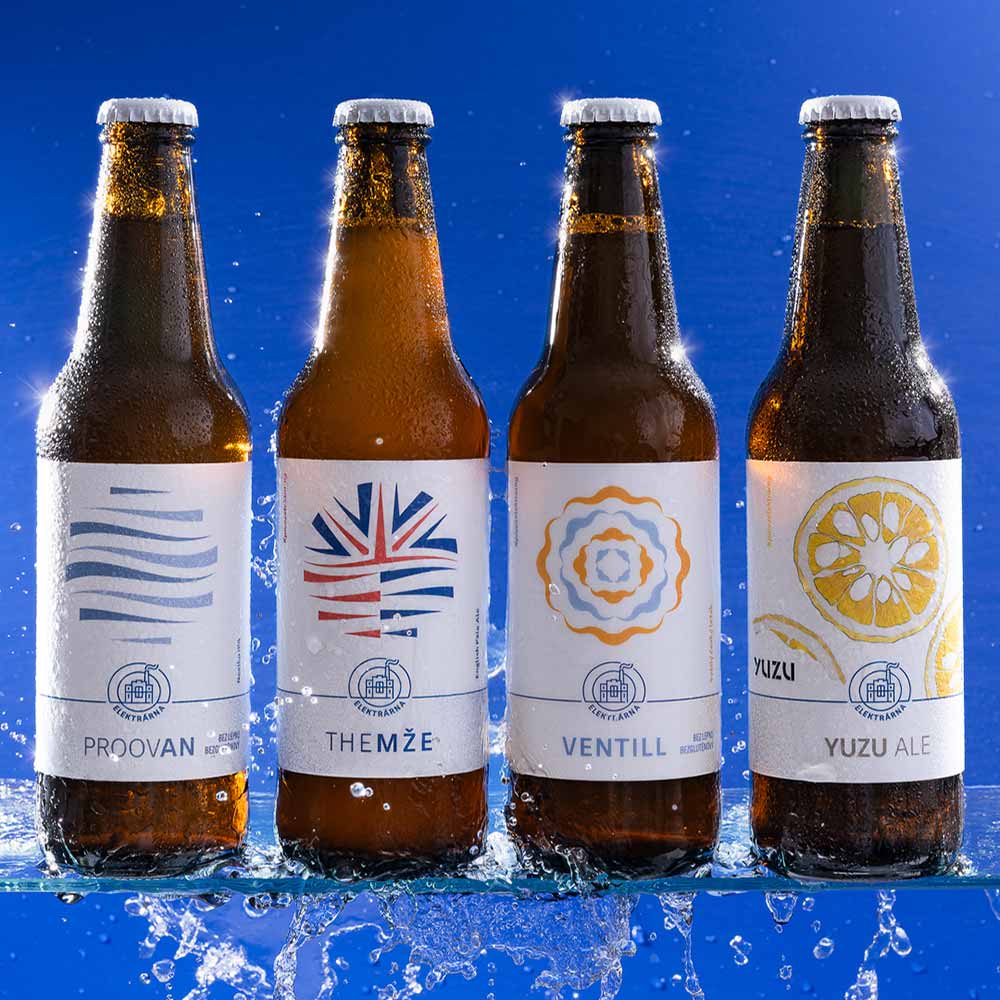
Photography courtesy of Pivovar Proud
Although Straková says it’s hard for her to pick a beer she’s most…proud of since, like her own kids, she loves them all, she did admit that one beer in particular pleasantly surprised her.
Simply named Yuzu Pale Ale, this fruited ale often rotates as one of the most popular.
Designed as a limited edition, Yuzu Pale Ale is a simple pale ale recipe with a fifty-fifty mixture of imported yuzu fruit and sugar added at the end of brewing to mix well with the wort, Straková explains. “Everything ferments, and just the aroma and part of the bitterness character from the fruit goes into the beer,” she says. “Normally, if we say this is a fruit beer to our visitors, they all expect something sweet, but it isn’t. It’s regularly bitter with a nice aroma of citrus.”
Which is also complemented by the Citra and some Czech hops.
The beer behaves differently from everything Straková learned when it comes to fermentation. “We were told in our school that every beer ages and after some time rapidly changes its character, and this one that isn’t so,” she explains. “The [fruity] aroma lasts at least five times longer than the hoppy aroma, which normally decreases after two to three months, so it’s quite stable.”
In addition to Yuzu Pale Ale, Straková says they’re currently working on a witbier and a sour beer with apricots.
Powering the Next Light-Bulb Moment at Proud
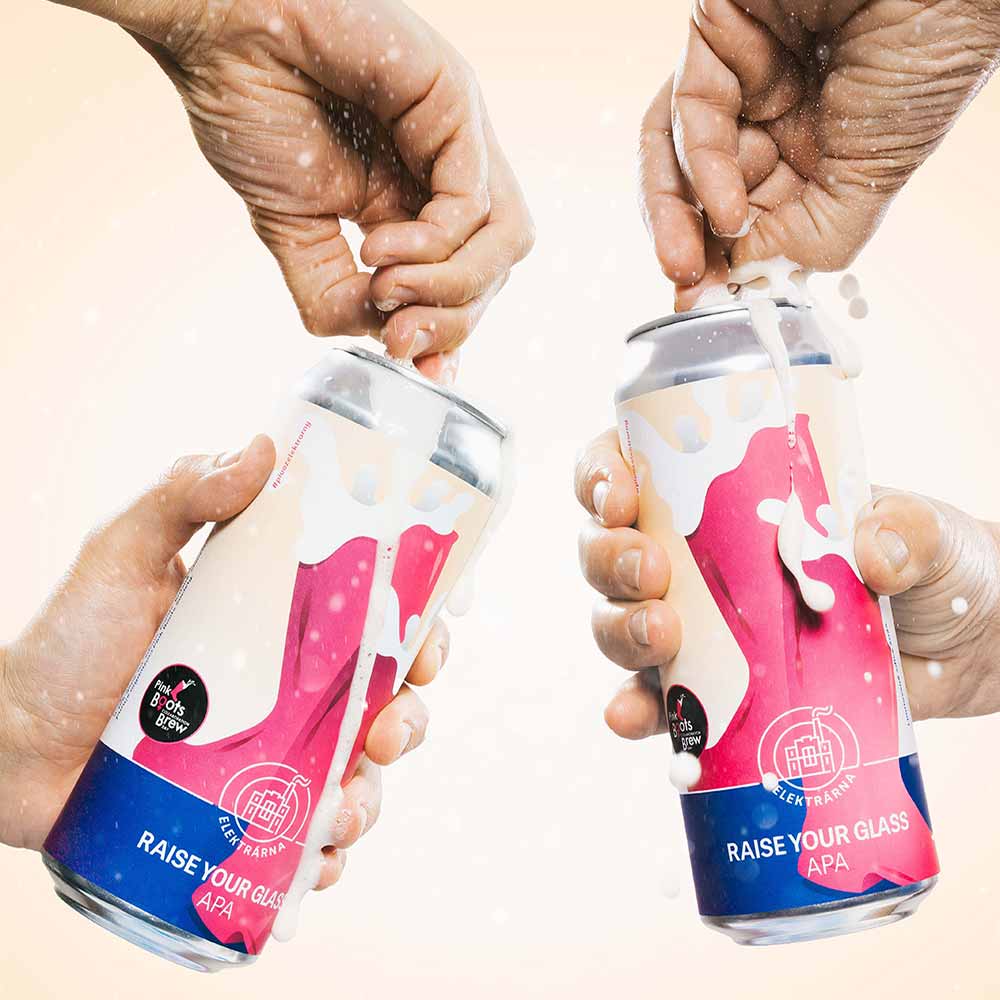
Photography courtesy of Pivovar Proud
Like electricity, the balance of spark and stability at Proud is paramount. While Straková thinks Ventill will continue to sell the best, she hopes the success of other beers is a sign that Czech palates are open to trying new styles…and constructs.
Much like the rest of the world, brewmasters in Czechia have long been primarily male.
As a brewmaster herself, Straková has seen that stigma slowly change.
“We worked hard with our girls in our industry to change this stereotype because it’s not true,” she says, noting women have worked in laboratories and various roles in brewing for a long time; it’s just the brewmaster who has always been male. “It’s changing. We are trying to get more attention, so if anyone asks, we say, ‘Oh, it’s not true. Just try to explore the industry more and connect with others.’”
For instance, for the last four years, Straková has led a Pink Boots brew day at Proud, dialing in a recipe for an American pale ale called Raise your Glass APA.
She says the project has struck a chord, with at least fifteen breweries signing up to participate this year, brewing everything from IPLs to American pale ales to session IPAs to hazies.
Much like Proud itself, perhaps it’s a not-quite-neon sign that times are changing.
Every year, more than half a million visitors travel worldwide to Plzeň just to visit Pilsner Urquell. While they hope to get a taste of the world’s most iconic unfiltered, unpasteurized pilsner, they probably don’t even realize that a short bus ride away, something else is brewing, like clouds gathering before a storm, the wind picking up and shifting.
As Berka ushered us back onto the bus to go back to the Pilsner Urquell brewhouse, the air seemed charged. People huddled energetically, talking about what we’d just seen and tried. I’m probably going too far here when I say, as the bus pulled away, I stared up at that towering smokestack, and the hairs on my arm stood up. Fitting, though, because with Straková leading the charge at Proud, it seems like the sky is the limit.

